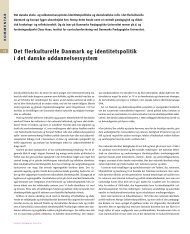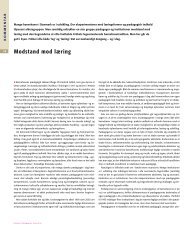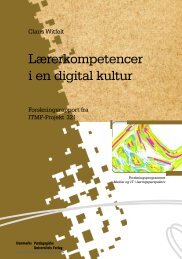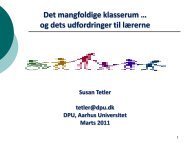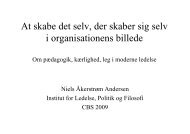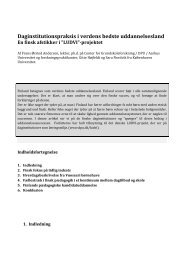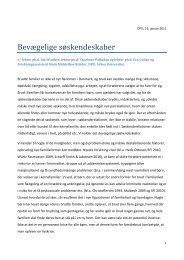SRI-Teknisk rapport-sen.v13 - DPU
SRI-Teknisk rapport-sen.v13 - DPU
SRI-Teknisk rapport-sen.v13 - DPU
Create successful ePaper yourself
Turn your PDF publications into a flip-book with our unique Google optimized e-Paper software.
Section B: Study Aims and Rationale<br />
98<br />
English<br />
B.1 What are the broad aims of the study? Explicitly stated (please specify)<br />
The purpose of this study was to explore the relationship<br />
between (a) changes in the scores from the<br />
Maryland State Performance Assessment Program<br />
from 1993 to 1998 and (b) classroom instruction and<br />
assessment practices, student learning and motivation,<br />
students' and teachers' beliefs about and<br />
attitudes toward the assessment, and a school<br />
characteristic. Several factors from each of these<br />
dimensions were found to explain a significant<br />
amount of variability in school performance over<br />
time using growth models.<br />
B.2 What is the purpose of the study? B: Exploration of relationships<br />
B.3 If the study addresses a 'what works' question,<br />
does it focus on outcomes or process?<br />
B.4 Why was the study done at that point in time,<br />
in those contexts and with those people or institutions?<br />
Explicitly stated (please specify)<br />
The nature of assessment programs has also<br />
changed with time to mirror<br />
the philosophies of different educational reform<br />
movements. In accordance with<br />
the most recent educational reform movement, a<br />
number of states are now implementing<br />
statewide assessment programs that involve performance-based<br />
tasks, in<br />
response to arguments that assessments utilizing<br />
more traditional types of standardized<br />
tests have led to educational practices that overemphasize<br />
basic skills<br />
(e.g., Resnick & Resnick, 1992). The prevailing<br />
assumption underlying the use of<br />
performance-based assessments is that they encourage<br />
the use of instructional<br />
strategies and techniques that foster reasoning,<br />
problem solving, and communication<br />
(National Council on Education Standards and<br />
Testing, 1992). One state implementing<br />
such an assessment program is Maryland.<br />
The Maryland State Performance<br />
Assessment Program (MSPAP) is designed to provide<br />
school-level<br />
information at Grades 3, 5, and 8 and to provide<br />
information for school accountability<br />
and improvement (Maryland State Board of Educa-



